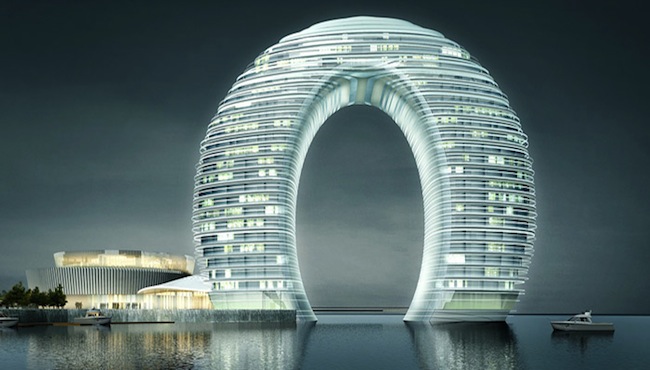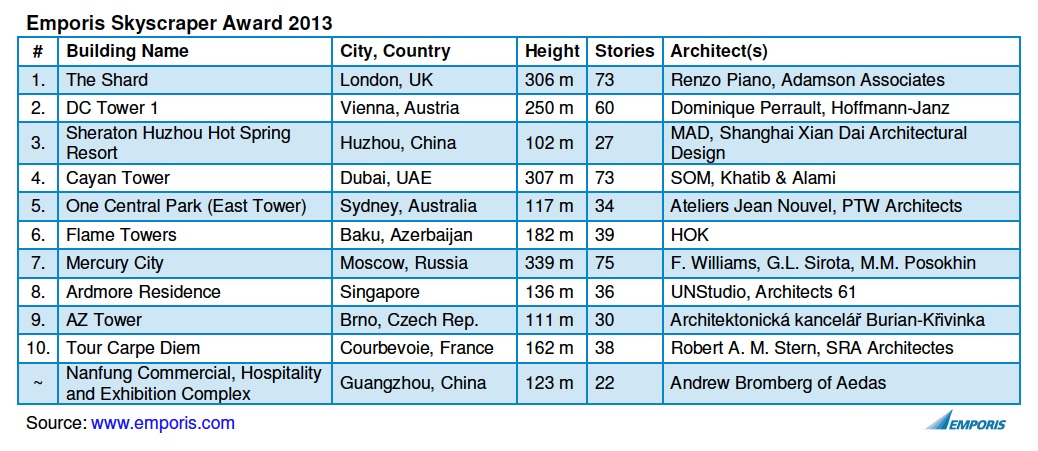The Emporis Skyscraper Award, the world's most renowned prize for skyscrapers, this year goes to London.
The tallest building in Western Europe, The Shard, was chosen by an international panel of experts from more than 300 skyscrapers of at least 100 meters' height and which were completed during the previous calendar year.
The award, given by Emporis, the international provider of building data, is now into its 14th year.
The 306-meter-tall winning building, designed by the architect Renzo Piano, won over the jury thanks to its unique glass fragment-shaped form and its sophisticated architectural implementation.
"Construction of The Shard was complicated by the particularly tight site and therefore needed innovative planning. This makes the result all the more impressive: a skyscraper that is recognized immediately and which is already considered London's new emblem," stated the expert jury in explaining its decision.
Second place in the voting went to DC Tower 1 by Dominique Perrault Architecture. The 250-meter-tall Viennese skyscraper particularly stands out for the contrasting way in which its facade is treated: Three mirror-smooth sides are broken by a craggy, jagged fourth that gives the building a strength of expression and sense of solidity, despite its slim stature.
DC Tower 1 also impressed due to its comprehensive sustainability concept, including photovoltaics to generate energy, local plants with low water requirements in the green areas of the building, and electric car chargers to save on CO² emissions.
The third-placed project also breaks with the standards of conventional high-rise architecture and thus adds to the great variety of forms and shapes that characterizes this year's Emporis Skyscraper Award. Located on Lake Tai, the Sheraton Huzhou Hot Spring Resort, conceived by last year's winning architects MAD, is a 102-meter-tall hotel whose shape evokes a gigantic ring. Its daring design is further accentuated by its illumination at night, which creates imposing reflections of the building in the lake.
After the award had gone in the last two years to Absolute World Towers in Canada and New York by Gehry at Eight Spruce Street in the U.S., no North American skyscraper is to be found in the Top Ten on this occasion. By contrast, the Emporis Skyscraper Award winners' list contains a total of five European projects – the last time so many were represented was six years ago. With The Shard, this is the fifth time the coveted architecture prize has gone to Europe.
About Emporis
Emporis is a leading database of information about building and construction projects, based in Germany. For over a decade Emporis has helped companies, organizations and individuals stay informed about the building industry. The Emporis Skyscraper Award is the world’s most renowned prize for high-rise architecture.
About the Award
The Emporis Skyscraper Award has been given since 2000. The jury is formed of architecture experts from all over the world, who judge nominated buildings according to aesthetic and functional design criteria. Previous winners include Absolute World Towers (2012), New York by Gehry at 8 Spruce Street (New York City, 2011) and Hotel Porta Fira (L’Hospitalet de Llobregat, 2010).
Related Stories
| Feb 10, 2011
Zero Energy Buildings: When Do They Pay Off in a Hot and Humid Climate?
There’s lots of talk about zero energy as the next big milestone in green building. Realistically, how close are we to this ambitious goal? At this point, the strategies required to get to zero energy are relatively expensive. Only a few buildings, most of them 6,000 sf or less, mostly located in California and similar moderate climates, have hit the mark. What about larger buildings, commercial buildings, more problematic climates? Given the constraints of current technology and the comfort demands of building users, is zero energy a worthwhile investment for buildings in, for example, a warm, humid climate?
| Feb 9, 2011
Hospital Construction in the Age of Obamacare
The recession has hurt even the usually vibrant healthcare segment. Nearly three out of four hospital systems have put the brakes on capital projects. We asked five capital expenditure insiders for their advice on how Building Teams can still succeed in this highly competitive sector.
| Feb 9, 2011
Businesses make bigger, bolder sustainability commitments
In 2010, U.S. corporations continued to enhance their sustainable business efforts by making bigger, bolder, longer-term sustainability commitments. GreenBiz issued its 4th annual State of Green Business report, a free downloadable report that measures the progress of U.S. business and the economy from an environmental perspective, and highlights key trends in corporate culture in regard to the environment.
| Feb 8, 2011
AIA names 104 members to College of Fellows
The Fellowship program was developed to elevate those architects who have made a significant contribution to architecture and society and who have achieved a standard of excellence in the profession. Election to fellowship not only recognizes the achievements of architects as individuals, but also their significant contribution to architecture and society on a national level.
| Feb 4, 2011
President Obama: 20% improvement in energy efficiency will save $40 billion
President Obama’s Better Buildings Initiative, announced February 3, 2011, aims to achieve a 20% improvement in energy efficiency in commercial buildings by 2020, improvements that will save American businesses $40 billion a year.
| Jan 31, 2011
Cuningham Group Architecture launches Healthcare studio with Lee Brennan
International design firm Cuningham Group Architecture, P.A. (Cuningham Group) has announced the arrival of Lee Brennan, AIA, as Principal and Leader of its new Healthcare studio. Brennan comes to Cuningham Group with over 30 years of professional experience, 22 of those years in healthcare, encompassing all aspects of project delivery, from strategic planning and programming through design and construction. The firm’s new Healthcare studio will enhance Cuningham Group’s expertise in leisure and entertainment, education, mixed-use/housing and workplace environments.
| Jan 31, 2011
HDR Architecture Releases Evidence-based Design Videos
As a follow-up to its book Evidence-based Design for Healthcare Facilities, HDR Architecture, Inc. has released three video case studies that highlight evidence-based design principles in action.
| Jan 31, 2011
CISCA releases White Paper on Acoustics in Healthcare Environments
The Ceilings & Interior Systems Construction Association (CISCA) has released an extensive white paper “Acoustics in Healthcare Environments” for architects, interior designers, and other design professionals who work to improve healthcare settings for all users. This white paper serves as a comprehensive introduction to the acoustical issues commonly confronted on healthcare projects and howbest to address those.
| Jan 28, 2011
Firestone Building Products Unveils FirestoneRoof Mobile Web App
Firestone Building Products Company unveiled FirestoneRoof, a first-of-its-kind free mobile web app. The FirestoneRoof mobile web app enables customers to instantly connect with Firestone commercial roofing experts and is designed to make it easier for building owners, facility managers, roofing consultants and others charged with maintaining commercial roofing systems to get the support they need, when they need it.
| Jan 27, 2011
Perkins Eastman's report on senior housing signals a changing market
Top international design and architecture firm Perkins Eastman is pleased to announce that the Perkins Eastman Research Collaborative recently completed the “Design for Aging Review 10 Insights and Innovations: The State of Senior Housing” study for the American Institute of Architects (AIA). The results of the comprehensive study reflect the changing demands and emerging concepts that are re-shaping today’s senior living industry.













